No products in the cart.
Outdoor Adventure
How Michigan’s Milkweed Inn Highlights Nature in Every Meal
It’s not that I don’t like food. I do. I carry frozen cheesecakes on winter expeditions. They’re caloric and they don’t freeze hard, so you can bite off chunks without chipping your teeth. I once ate the same dead catfish boiled over a fire for three days. Was it good? Absolutely not. I like cardamom, snap peas, and Asian pears. I eat frozen bean burritos. I hate raw tomatoes, a trait I attribute to growing up near a ketchup factory in California. Tomatoes festered on every street corner and stuck to the soles of my flip-flops. They rolled off trucks en route to the factory, then rotted in the sun.
My husband, on the other hand, was raised by an epicurean grandfather, driving hours one-way for frog legs, bouillabasse, a pastry shaped like a bird’s nest. We have twin babies now. He wants them to appreciate good food, so he’s learning to cook. In pursuit of this goal, he discovered the Milkweed Inn, a remote bed and breakfast in Michigan’s Upper Peninsula where superstar chef Lane Regan (formerly Iliana) cooks foraged ingredients for a handful of guests in exclusive weekends that sell out years in advance. This year, my husband’s been helping out at the Inn, building a woodshed and tending colonies of bees. He’s developed a new language, dropping words like “garum” and fermenting wild plums on the top shelf of our closet. In exchange for his work, Lane offered us a slot on a last-minute November weekend—and my husband, excited to share a place he loves, gave the slot to me.
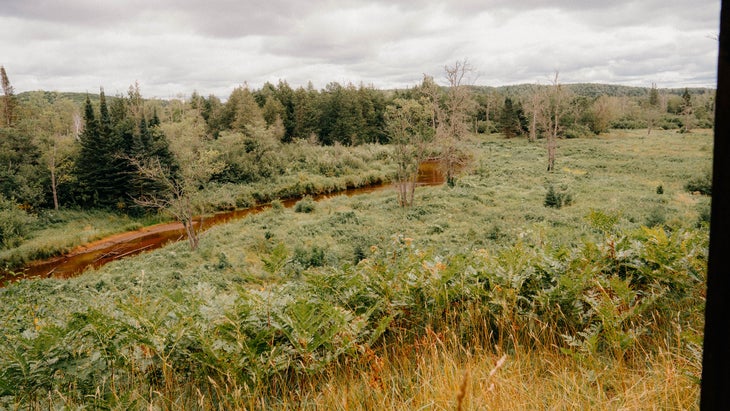
The Inn lies about a mile from two-lane Highway 13 as the crow flies, and 25 miles by unmarked dirt road. Guests caravan. It’s a log cabin with a central parlor that’s half kitchen, adorned with Pendleton blankets, paintings of foxes, and Chef’s three Michelin stars. Tonight’s dinner is not the star of the weekend—that would be Saturday’s 15-course tasting menu—but as guests gather around the three small tables, it’s clearly no less anticipated. I scoot in at the corner table with two couples, dodging a silky lump that reveals itself to be a Shih Tzu named Clemmie. George, a nine-year-old Newfoundland, sprawls like a bear rug by the hearth.
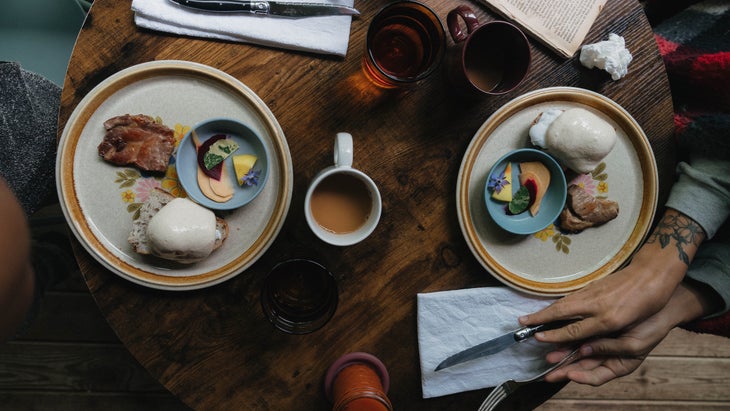
Host Rebecca, a breezy redhead with pigtails and an expression of warm concern, brings dishes of savoy cabbage with pine flower miso and milkweed flower vinegar that have my tablemates gasping. It’s meaty, complex, and—to my inexperienced palate—ineffable. I feel like a phony for eating it without the knowledge to name the tastes. Like wild mushrooms, I think, tentative even in my mind—and when a neighbor mentions the same, I feel a sprig of confidence. By the bread course, a thick warm sourdough with tangy goat milk butter and honey, I find myself relaxing. The trout in herb gribiche is fleshy and tastes like lake in the best way, and dessert—a profiterole with spruce ice cream and chaga cookie top that cracks into patches like the spots on an amanita—offers an almost musical experience of bliss.
By the time guests sigh and lean back, the woods outside the windows are black. The nearest neighbors are more than a howl’s reach away. Rebecca did a 12-day silent retreat “in order to be able to work here—because one struggles with one’s mind,” she remarks of the Inn’s isolation, gliding to the table with postprandial tea. A guest inquires if she has any decaf coffee. “No the fuck we do not,” she says.
I sleep outside by choice, full-bellied in two sleeping bags, and wake to daylight in a shell of ice.
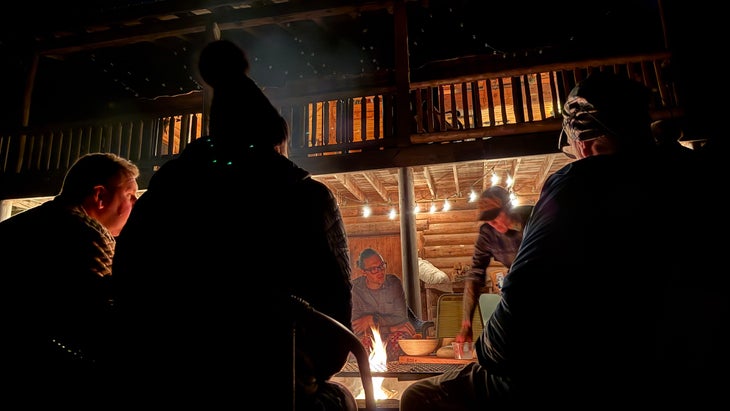
By first breakfast—banana-walnut bread with salt and butter—the guests are familiar with each other. They’re midwestern, foodies, adventurous—two retired couples, a pair of restaurant owners, and a data scientist and millennial geriatrician from Madison, Wisconsin. Chef Lane bustles in the kitchen, answering questions and offering guidance on the wood-fired sauna. They’re slim and soft-spoken, with a teal moth tattooed on their neck, wings filling the open collar of their tucked-in wool flannel. In a minute they stir, scoop, plate, taste, give hiking suggestions, and brush Shih Tzu Clemmie’s eyebrows up with their hand, securing them with plastic barrettes. Second breakfast is tacos on green tortillas, tinged with weeds picked that week.
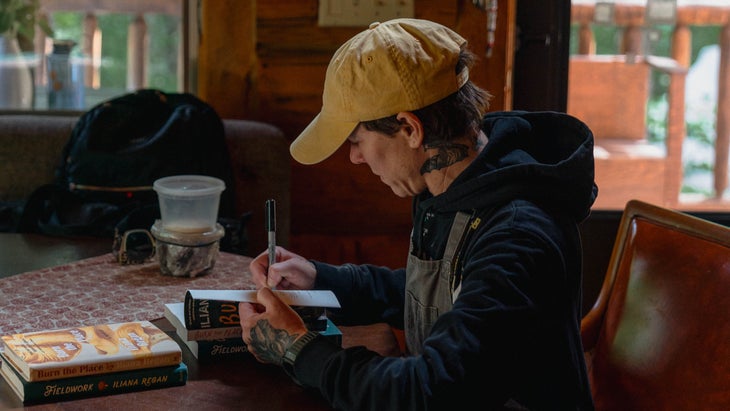
The day is food and leisure; some folks wander to the Sturgeon River, descending a trailless slope, while others knit, hike, or read. I sit briefly in the loft, overhearing snippets of conversation. “One time I got stung by a hornet on my butt cheek and [redacted] sucked all the venom out of me,” someone remarks. “That was the most romantic thing he’s ever done.” Later, thoughtful: “My tapeworm’s the only one who understands me.”
When guests stay too long in the sauna, Lane worries. “Do you think they passed out?” they murmur. “Maybe they’re cooking.”
Lane says that guests at Milkweed fall on a spectrum: on one extreme, foodies who rarely step outdoors, and at the other, outdoorsfolk who—like myself—“have never even had a tasting menu.” It’s Milkweed that brings them together.
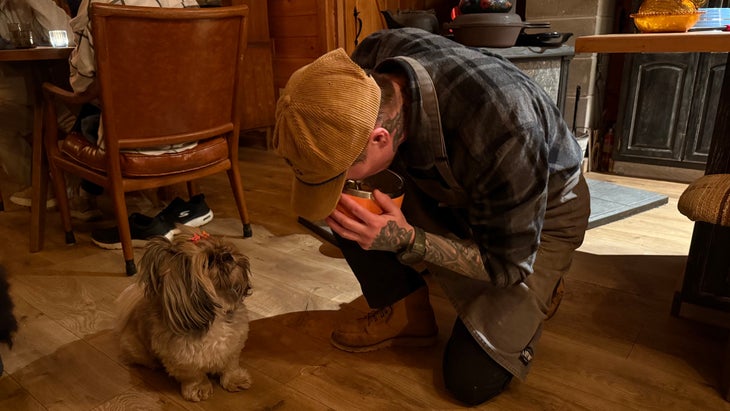
As an adventurer, I’m often in the position of enticing people outside, and it can be a hard sell. Not because the highs aren’t great, but because folks fear the lows: bugs, cold, bears, isolation, toilet paper made of leaves. And yet here’s Milkweed, pulling magic: calling new people into the Northwoods, not in spite of discomfort, but for pursuit of pleasure alone.
Lunch starts with a salad of fennel and carrot two ways (shaved raw, and blanched and marinated in lemon), moose garum and egg white aminos with marinated white beans and garnished with chamomile. The flavor is multisensory, euphoric; I feel it in my arms. Something’s sweet on my tongue, and tart on the sides of my mouth, and there’s a tinge of smoke, too, which surprises me.
“We fed the moose firewood,” says cooking resident Jade. She’s joking, but she might as well not be, because I swear it’s all there: the soil, the rain, the antlers, the trees. And when it hits me, I almost laugh from the revelation: foraged food isn’t just about bringing people into wildness. It’s about bringing wildness into our very mouths.
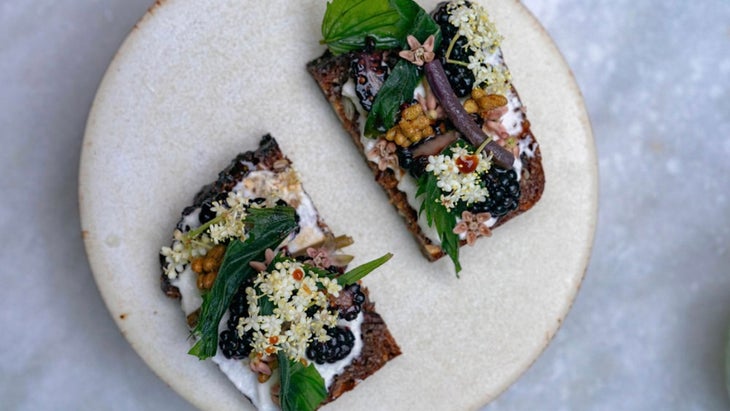
We can—we do—have nature inside us, even in the most conservative sense of the word: wilderness as nonhuman, nature as beyond control. What’s a tapeworm if not a reminder that our bodies are ecosystems, too? But this place, this cooking, this food—it turns fear into pleasure. Savoring a wild lion’s mane mushroom is no less an engagement with wildness than spotting one in the woods, and it is—in a tactile way—more accessible to most.
I’m not proud to realize that my lack of engagement with good food was, in minuscule part, because I thought myself above it. Because, while I savor comfort, I’ve always prided myself on enduring its lack, and I have in me some Puritan sense that suffering for a goal gives you greater pride. I have struggled in my life to let myself be purely content, and maybe food represents that: it turns a need into a gift. I’ve spent decades chasing wilderness, when it could always be right here: on my plate, in my mouth, in the animal body that I am.
Source link
